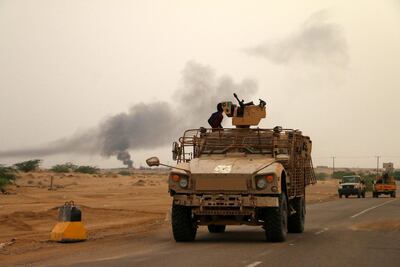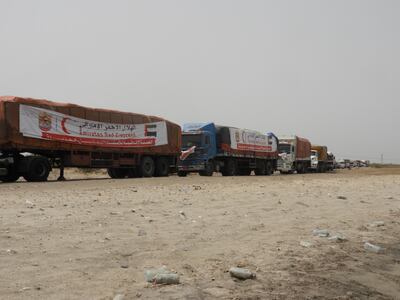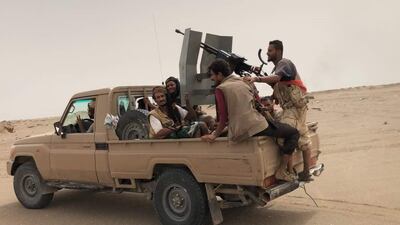Yemeni government forces backed by international support have recaptured the whole airport compound just outside the city of Hodeidah after fierce fighting with Houthi rebels who have targeted civilian populations in recently liberated areas.
"The airport was completely cleared, Thank God, and is under control," coalition commander for the Red Sea coast, Brig Abdul Salaam al-Shehi, said in a video posted by the state-run WAM news agency.
The agency reported that many Houthi fighters had fled in the final phase of the battle, including field commanders. Mr Shehi said that at least 250 Houthi had been killed in fighting for the airport and a further 87 taken prisoner.
Hodiedah airport on Wednesday was calm, the intense clashes of the day before had subsided although coalition Apache helicopters and warplanes launched dozens of salvos at Houthi pockets surrounding the transport hub as ground forces combed the huge airstrip for any remaining rebel fighters.
The forces of the Giants brigade positioned at the front of the airport rested through Wednesday morning, preparing to mobilize for a renewed offensive to wrest control of a key supply route named KILO 16 east of the city, the joint operations room said.
Several teams of journalist were allowed to travel to the rear of the lead brigades and are waiting for developments on the ground.
News coming from the city centre indicated that in the course of digging trenches and fortifications the Houthis have damage the water network resulting in supply being cut in some populated neighbourhoods.

"We are suffering water shortage, the Houthis are digging in the areas where pipelines are laid which damaged it and this caused many troubles for many neighbourhoods around our street," Rasheed Bekhiet, a resident from the city of Hodiedah, told The National.
But as forces prepare for a renewed push to cut KILO 16, tons of UAE supplied aid is lining the road towards the front line, ready to provide vital supplies to those trapped in the city at the earliest opportunity.

In an interview with Sky News Arabia, Mr Shehi claimed the battle for the airport had been made difficult by Houthi force using human shields. He gave the example of a Houthi tank shelling the airstrip from between civilian homes near the facility. Mr Shehi said coalition backed forces were taking the utmost care to avoid civilian casualties.
With the airport under control, government forces will secure the surrounding area before pushing to cut a key rebel supply route known as KILO 16.
__________
Read more
Houthi exit from Hodeidah non-negotiable says Gargash
Government troops storm Hodeidah airport after fierce clashes
__________
The Arab Coalition Forces said Iranian-backed Houthi militias had directly targeted civilian populations in the Tehama region, north-west of Hodeidah.
The force said the rebels were deliberately targeting civilians and residential areas in a way that it said was a violation of the Fourth Geneva Convention. The coalition also invoked the need to protect civilians under international humanitarian law. The Coalition has called on the international community to pressure the Houthis to stop "violent and illegal acts against the Yemeni people."
A group of Somali and Ethiopian refugees who had fled the city for Mocha arrived hungry and exhausted. The Houthi command has been previously accused of stealing humanitarian supplies intended for civilians. Although the UAE and other states have been sending a large amount of humanitarian aid into the city for civilians, the humanitarian situation is unclear.
The men told The National that they had been chased by a group of rebels who tried to recruit them. They said the Houthi had given them a start choice: accept food and khat – a plant with mild stimulant property widely chewed in Yemen – to fight or dig trenches or be shot dead for fleeing.
__________
Arab Coalition lays bare Iranian support for Houthis in Yemen
__________
Pro-government commander, Brig Gen Raed Al-Habhi told Sky News that demining operations were ongoing at the airport. Earlier this week, two captured Houthi conscripts told government forces during interrogation that the rebels had been planning to blow up the airport if they lost control of the facility. That does not appear to have happened.
"In the next few days we will go to Hodeidah and then to Sanaa and all areas of Yemen to clear it of the Iranian terrorist militias," Brig Gen Habhi told Sky News.
The airport is disused but housed a major rebel base just inland from the coast road into the city from the south.
It lies just eight kilometres from the city's port, through which three-quarters of Yemen's imports pass, providing a lifeline for some 22 million people dependent on aid.
Dr Abdulaziz Al-Wasel, Ambassador of Saudi Arabia to the United Nations in Geneva, addressed the Human Rights Council late Tuesday evening and said that the decision to launch military operations in Hodeidah “came from the Yemeni government as a result of the depletion of all political efforts with the militias, their continuing threat to the navigation in the Red Sea and the continuing looting of relief shipments arriving at the port of Hodeidah.”
He said delays in the operation had come from their attempts to protect civilians and to give Houthi rebels a chance to withdraw “peacefully to avoid humanitarian and civilian losses”.

